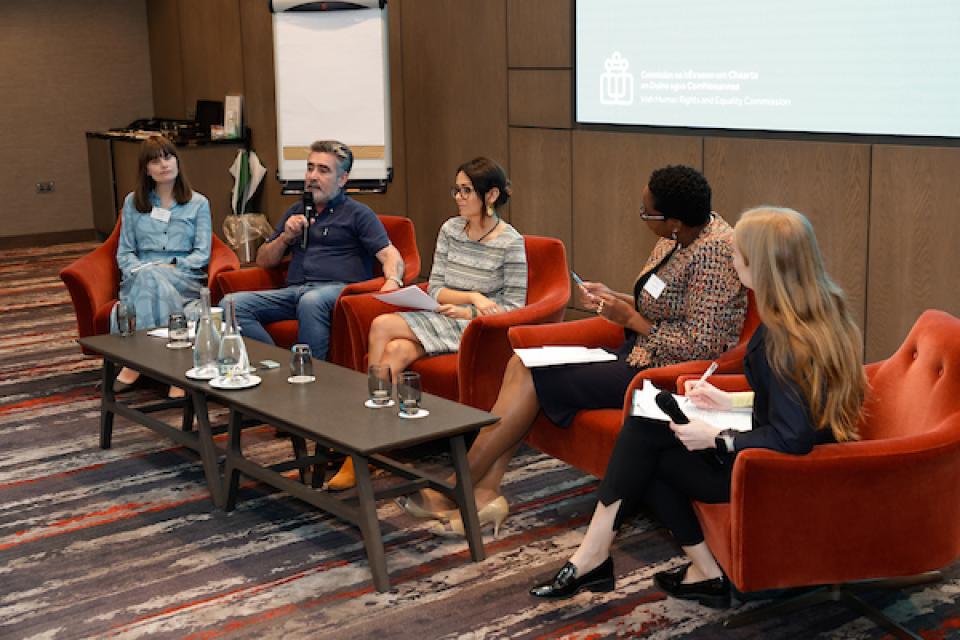
Research
Brave is a 4-part series of digital storytelling videos, featuring Ashley, Moses and Roxanna, as they explore the themes of identity, belonging, racism and creating a better future. It is part of a project that is exploring the experiences of children and young people growing up in Ireland with second-generation migrant and ethnic minority backgrounds (Machowska-Kosciak & Barry, 2022).
To access the series of videos and guidelines for use, please click here.
The DCU Centre for Human Rights and Citizenship Education (Dr Benjamin Mallon) is partnering with the DCU Further Education & Training Research Centre (Dr Justin Rami and Dr John Lalor) in a EU Horizon funded project on education for democracy. The DEMOCRAT Project (Grant Agreement No. 101095106) runs from 2023-2026 across ten European countries and will develop participatory educational approaches to strengthen democratic competencies in primary and post-primary schools. In the Irish context, a Living Lab involving EfD experts, teacher educators, teachers and children/young people has been running since Spring 2023. Participants in the Living Lab are currently co-designing two innovative local projects which aim to tackle challenges to democracy in Ireland. The first project seeks to develop empathy through game-based approaches to EfD. The second project is addressing mis/disinformation in online and offline spaces.
Anyone seeking further information on the DEMOCRAT Project in Ireland can contact benjamin.mallon@dcu.ie.
The CHRCE (Dr. Maria Barry and Dr. Benjamin Mallon) is delighted to be a part of the Global Village programme, in partnership with the Irish National Teachers Organisation (INTO), the Irish Primary Principals Network (IPPN) and Trócaire. In September 2023, Irish Aid, at the Department of Foreign Affairs, awarded the Global Village consortium €1.2 million to manage and deliver a new strategic approach to Global Citizenship Education (GCE) in primary schools between 2023 and 2026.
Providing a wider and deeper programme of professional support to all primary school teachers and school leaders to further integrate GCE into primary schools across Ireland is a central concern for the programme. In 2020, Irish Aid (2020) reported that over 29% of primary schools were supported to deliver some level of GCE and just under 4,000 primary teachers or student teachers received some professional development in GCE related themes. Yet, there remains significant opportunities for GCE practice to be strengthened.
Over the next three years and more, Global Village seeks to build a range of supports and initiatives for primary school communities in a way that ensures national reach and quality provision to ensure that primary school pupils are supported to participate as active global citizens committed to building a fairer and more sustainable world.
For more information about Global Village check out globalvillageschools.ie or email Ben (benjamin.mallon@dcu.ie or maria.barry@dcu.ie).
Integrating our Voices into Teacher Education (INOVATE) is a 3-year project to promote and support the positive integration of young migrants within Irish society. Specifically, the project seeks to amplify the voices of young migrants, sharing their stories of integration in Ireland to enhance understanding of migrant experiences in teacher education programmes.
The Principal Investigators are Maria Barry and Malgosia Machowska-Kosciak and the project received €164,000 through the Department of Children, Equality, Disability, Integration and Youth's National Integration Fund. Activities include ethnographic interviews and the development 'Brave': a 4-part series of digital storytellig videos on identity, belonging, racism and better futures. So far, the project has reached over 1,000 student teachers and teachers and the Brave series is due for a public launch in September 2024.
For more details, please contact maria.barry@dcu.ie
Project overview: Between 2020 -2022, Dr. Malgosia Machowska-Kosciak and Dr Maria Barry from the Centre for Human Rights and Citizenship Education (CHRCE) collaborated with the Irish Human Rights and Equality Commission (IHREC) and number of second generation young people. As a result, the report on ‘Experiences of Second Generation Young Ethnic Minority Young People in Ireland’ was produced and was launched by IHREC in February 2020.
This ongoing collaboration contributed to ‘National Action Plan Against Racism’ 2022'.
Our expertise was acknowledged during Towards Equality Data for All Forum organised by IHREC in June 2023. Dr Malgosia Machowska Kosciak and Dr Maria Barry have contributed to key discussions on the development of ‘the National Strategy on Equality Data Collection for Ireland’ - one of the first strategies of this kind in Europe!
Race Equality Forum Speaker included:
Dr Gozie Offiah, Senior Lecturer, Chair of Royal College of Surgeons in Ireland (RCSI)
Martin Collins, Co-Director, Pavee Point Traveller & Roma Centre
Jenny Liston, Roma Programme Manager, Pavee Point Traveller & Roma Centre
Dr Malgosia Machowska-Kosciak, Centre for Human Rights & Citizenship Education,
Dublin City University (DCU)

Four panel attendees

IHREC Panel discussion
PI Name: Ashling Bourke
Team members: Kristin Hadfield (TCD), Lauren Walsh (RA), Aisling Martin (RA), Salam Jabbour (RA)
Project Description: The project will examine the literature that examines how a social ecological approach to understanding climate change attitudes. It includes a systematic of the empirical literature and a review of the main attitude formation and change theories as applied to climate change. It will also identify toolkits or best practice interventions on social ecological approaches to climate change attitudes.
Timeline:
February 2024: Report to the Environmental Protection Agency on literature review (systematic literature review, applicable theories, examples of toolkits or best practice interventions on climate change attitudes)
2024: Publication and conference presentations with the findings.
This section of our website is currently being updated
Funded by Trocaire, this small-scale qualitative research project, undertaken by Dr Benjamin Mallon, Dr Maria Barry and Saibh ní Loinsigh, explored teachers’ experiences of DE in disadvantaged settings, their insight into the factors that both support and hinder opportunities for children and young people to experience DE, and their perceptions of the mechanisms by which the provision of transformative DE can be facilitated in DEIS school settings.
